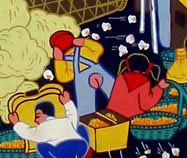Gary's Stories of Life in China
These are the same stories that you will find sprinkled throughout the listings in our website.
A bunch of our customers contacted me, asking that I compile these stories so that they could all be read in one place.
So here you go... ...Some of them are more interesting than others. I will try to add more from time to time.
South China Village Travels
How to Buy a Goldfish in China
Crazy Taxis and Deadly Buses
Come to China, Get Mooned by a Baby
Asian Art-Buying Journey
Art-Buying Adventures are Great, But the End, is Often a Relief
Anecdotes and Facts About China

This is the weekly market in a large village.
The women are wearing traditional head dresses of their tribe. Each tribe has a different color and style of headdress.
---
These ladies told me that they traveled for two days on foot from their little village in order to sell their vegetables here.
South China Village Travels
When I travel from place to place I see a lot of things, and sometimes there is a bit of that "glamorous adventure" that you might expect. But there is another side, which is the daily necessities that we all need to live.
I always carry enough food for 2 days in my backpack. This food is intended for emergencies. However, sometimes this emergency food is eaten when the dining car is only serving pig's feet and fish-head soup during multi-day voyages aboard one of China's many slow passenger trains.
Lucky for me, even in the smallest village, the people there need to eat too. Most of the time I find a wide variety of vegetables and at least a few kinds of fruit for sale at a curbside market.

The people from more than five smaller villages come here once a week to sell and trade their wares.
---
This man walked a pig all the way from his village, and butchered it on site. The meat will all be sold and cooked today, so there is no need for refrigeration (or so they tell me).
Many small villages don't have restaurants, so it is important to be able to fend for yourself. I can usually get some boiling water from somewhere (There is always somebody nearby making tea in China, so there is never a shortage of hot water). Throw in some ramen noodles, a few cut vegetables, maybe some dried meat, and you have a soup of sorts.
A lot of the time, I ask for hot water from a villager (who is shocked to see a foreigner) and I am immediately invited to eat in their home with the whole family. Suddenly I am the "honored guest". In the village-culture of China, it is an honor to have a guest in your home. They would be insulted if I offered money for the food and hospitality.
If it gets late, they will offer me a place to sleep in their home (often you are given one of the best beds in the house, but I seldom take that offer as some family member ends up sleeping on the floor when this happens).
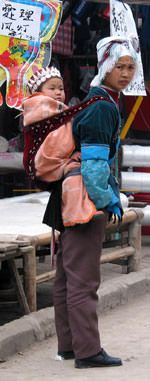
This young mother is wearing the headdress of her tribe, and the baby boy (prized because he is a boy) is wearing almost a crown-like headdress.
Sometimes a buzz starts in the village about the "visiting foreigner". I end up walking through the village with a dozen children following me down the street trying to practice English. In one case, I ended up teaching English in an elementary school for a day. The children had never seen a "white person" before, much less had a chance to talk to one - this fact seems to feed their curiosity and excitement.
By the way, there is no shortage of Children in minority villages of China. The "One-Child-Policy" does not apply to members of minority ethnicities. This allows for the small tribes and ethnic groups, as well as China's many minority nationalities to prosper and maintain their populations within China. It is the majority "Han-Chinese" people in the cities that must follow the "One-Child-Policy".
Another necessity is transportation. Sometimes things can get interesting in this department too. If there is not a "mini-bus" that comes near the village, I can often find a ride on a motorcycle, back of a truck, in a rowboat down river, or just hike. When I arrive in the next village, the adventure starts all over again...
Wanna buy a goldfish?
Do it South-China-style from the back of a tricycle...
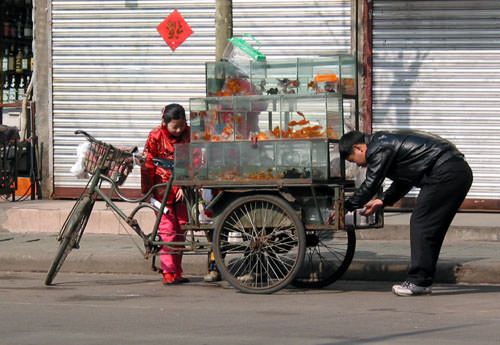
This little Chinese girl found a gold fish she likes, as the seller fills bag of water for her selection.
I travel all over China, and often see interesting things. Of course, some of these things are part normal everyday life in China's eastern culture, but might be very different from what you'll see in western cultures.
If you want to buy a goldfish or baby koi fish in Nanjing, this is where you will end up.
Of course, in China, you can buy a lot of things from the back of big tricycles. Everything from fruits and vegetables to cakes, candy, and even heating coal.
These tricycles are actually totally mobile stores, and can be found on different street corners every day.
I think it's brilliant, because once you've sold your goods to everyone in a neighborhood, you simply pedal your tricycle a few blocks away, and see how sales go there.
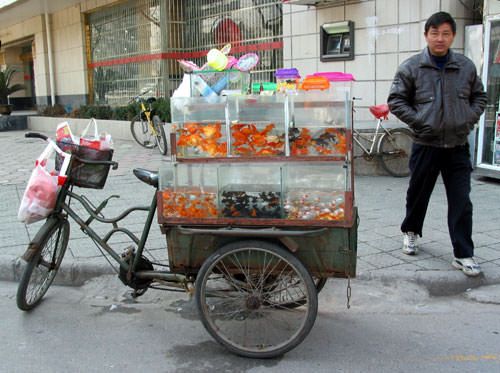
This tricycle retailer is selling goldfish and baby koi fish on the streets of China.
Of course, many of these entrepreneurs are not actually licensed businesses in China. So when the police come by, the tricycle retailer becomes a tricycle transporter, and zips down the street looking for a police-free area.
In Nanjing, all of these tricycle-goldfish-retailers seem to wear the same uniform, of a black leather jacket, black slacks and running shoes.
Proof of this can be seen in these two pictures. These are two completely different goldfish sellers, but they are both donning the same outfit.
One of the sellers told me that he offers a "one-week-no-die" guarantee. It seems like a good policy to me, except for the fact that in a week, you'd have to search pretty hard to find next week's street corner location.
Click here to learn more about us and the origin of this art
Transportation:
Crazy Taxis and Deadly Buses
A big part of searching for art in China involves dealing with trains, planes, taxis, motorcycles, camels, boats, bicycles, and a lot of time on foot.
The stories that I could tell you of the travel adventures in China might boggle your mind, so I will keep it simple.
In short, there is always a great adventure, but that doesn't mean that it's always a good time.
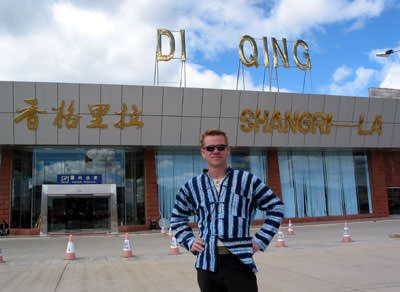
The new Shangri-La Airport. Offering 2 flights per day to any of two available destinations. But not on Sundays, Thursdays, and most Mondays.
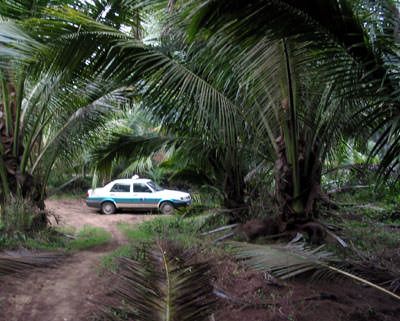
This taxi takes a lot of abuse as we drive down paths that are barely good enough to walk on.
The worst in my history is probably the overnight-sleeper bus from Kunming to the frontier of Tibet.
I have my choice between choking on the cloud of cigarette smoke inside the bus, or opening the window to be blasted with cold, yet fresh, arctic air.
Meanwhile the bus's audio system is playing a CD on continuous loop of the worst karaoke songs ever made. Listening to the same 5 horrible songs which sound like they were beaten to death on a 1972 Yamaha keyboard, for 20 hours straight, can really be hard on your sanity.
Arriving at the intermediate destination, the original plan is to continue deep into Tibet, but the only way is to take another bus-of-death.
I have no idea where I am, but I hang out for several days in the little Tibetan village drinking copious amounts of "Yak-Butter-Tea" and getting to know the locals. I even find a Tibetan Buddhist Monastery and spend a day with the monks.
Later I find out that this place is in the official location of legendary "Shangri-La". The place isn't bad, but the real reason that it's "Shangri-La" for me, is because I am no longer on a bus.
I toy with the idea of taking a bus back to Kunming, but chose to fly from the newly opened "Shangri-La Airport" instead. Later, I find out that the bus I was supposed to be on, tumbled off a cliff with no hope of survivors.
When I arrive in most cities around China, a taxi is usually the best way to get around. Most of the population of China do not own cars, so taxis are almost always plentiful wherever you go.
But, just like America, it seems that a lot of taxi drivers are not from the city where they are driving their taxi. Therefore, they only have a vague idea of where you want to go. This really does add to the adventure, because half the time I see something else along the way (as we are hopelessly lost) and just pay the fare and get out to check out the village or market or whatever caught my eye.
My wife and I went seeking adventures together recently and ended up on Hainan Island, just south of the Chinese mainland. You might remember this island from the news a few years ago, as it is the place that the U.S. Navy accidentally landed a spy plane.
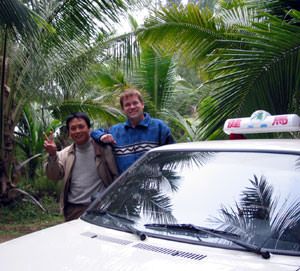
The taxi driver doesn't seem to mind the scratches that the palm trees left on the sides of his shiny taxi. He even posses for this picture after we find the secluded beach that I was searching for.
After crossing the South China Sea on a boat from the mainland, and spending a night in Haikou (the capital city of Hainan). We take a day long bus ride south, and find an enthusiastic taxi driver.
Our goal is to find a secluded beach with a little hotel. The taxi driver has a map, and we just point out a place that looks like it's out-of-the-way from where most tourists want to go.
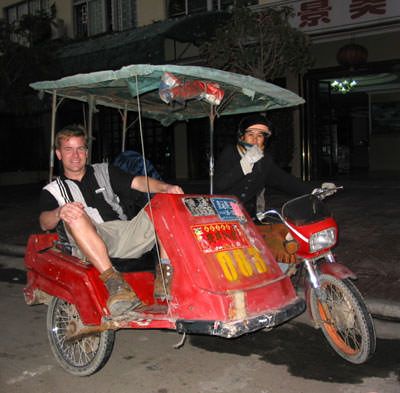
Probably not the safest way to travel, but way more comfortable than a bus. A moto-taxi like this one are the way to go on a warm tropical day anywhere in the far south of China.
What we don't realize is that it's secluded for a reason. The jungle is now overgrown, and there are no real roads to get there. The taxi driver is a real sport, and drives like a wild man on some soft sandy trails trying to get us to our destination. Palm branches scratch the sides of the taxi the whole way, and falling coconuts narrowly miss the taxi from trees that are disturbed as we pass.
Sure enough, the hotel in the area closed a couple of years prior to our arrival. But the workers had nowhere else to go, so they've taken to "squatting" at the old hotel building. We end up with about 5 miles of beach all to ourselves, only to be shared with the occasional shrimp boat passing by. The weather is so warm, that we just sleep in the soft sand with no need for a sleeping bag.
Getting to the next town only requires a few miles of hiking to the nearest village, and then flagging down a passing mini-bus.
Another great way to travel locally is by moto-taxi. The warm wind blows through your hair, and you almost forget about how dangerous it is to be weaving in and out of traffic on one of these deathtraps. Regardless of how dangerous they may be, I think it's a stylish way to get around, and also it's an efficient way to make sure your adrenaline glands are still working properly. Disneyland has nothing like this...
Just don't smile while you are taking your ride, or you'll get mosquitoes in your teeth.
Cheers,
-Your adventure art-buyer, Gary.
Come to China, Get Mooned by a Baby...
You may find this interesting, and many visitors to China are a bit shocked and bewildered the first time they see it. My job is to explain what's going on.
If you haven't been to China, imagine seeing a fully-dressed toddler, with a split in the butt of the outfit that allows a draft of epic proportions, by exposing some of the baby's most precious parts to the elements.
Maybe you're confused because all you see is a "baby butt crack", but Chinese parents see a way to have less mess, save money, and help the environment, while making their baby smarter - If I have your attention now, just read on to find out more...
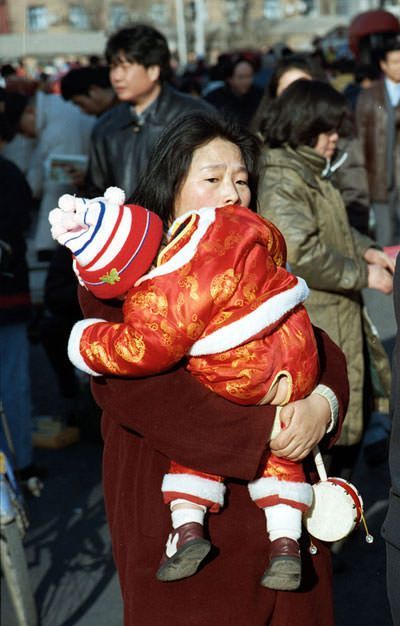
I took this picture on a very cold morning near the end of a harsh Beijing Winter. Still, this baby has his little butt hanging out in the breeze. Read the whole story to decide whether you are for or against this "crack draft" policy in China.
No Mess No Bother
These traditional split-crotch-jumpers have been around for generations. Within months after birth, these special toddler togs eliminate the need for diapers, and the associated mess, clean up and laundering or disposal. Instead of changing diapers all day, parents simply find a toilet or out house, hold their child over the appropriate receptacle, and "let fly". The secret is to make regular bathroom breaks for your toddler (every couple of hours) and have a signal (such as light whistling) to let your toddler know it's "time to go".
Also, there's no need to spend time dressing and undressing your child each time that nature calls.
Baby "Crack Draft"
Saving the Environment and Your Wallet
China can not afford disposable diapers. I'm not talking only of the high price of disposable diapers, but rather the environmental impact of such diapers.
There are around 1.2 billion people in China, and about
18 million babies are born every year.
At a conservative three diaper changes per baby per day, imagine the results of 54 million diapers being dumped in landfills every day!
Due to limited resources and landfill space, China already recycles just about everything that you can think of. They simply can not handle mega-tons of diapers filling up their small trash dumps.
Therefore, it's very hard to find disposable diapers in China, and they are seen by many Chinese people as a wasteful and expensive "western luxury" that only foreigners (mostly just Americans) would dare to purchase and use. At the time of writing, as far as I know, you can only get disposable diapers at Walmart in China.
Smarter Babies?
Another apparent benefit of this practice is the fact that Chinese babies master the art of toilet-training much earlier in life when compared to their American counterparts.
Summing it up
Now you know this practice saves money, saves the environment, and will have your child potty-trained at an earlier age.
The only downside is having to explain to confused non-Chinese people the important reasons why your baby is mooning them.
Where did I get this art?
Chronicles of an art-buying adventure in Asia...
Here's a typical art-buying trip that extended through thousands of miles of China (You can look at the bright green line on the map to the left). After a quick trip to South Korea, my real travel begins in Beijing with a train ride through Inner Mongolia, only to find that art is not abundant there, but ice and cold weather certainly are.
Map of My Art-Buying Travels in Asia
(My futile effort to make Marco Polo jealous)

Trips before 2004 are shown in red.
Latest trips & common routes are shown in other colors.
Heading south, though Ningxia Province, I stop in a little town called Zhongwei, where I meet one of the top Chinese calligraphers in the world. Meaning to only spend a day or two in this town, I spend the better part of a week with this talented calligrapher with lots of meals, tea, beer.
My next stop finds me tooling around a dune-filled desert on a camel. I think the jeep option would have been better.
Heading further south, I stop in Baoji in the Shaanxi Province, only to find an industrial city, devoid of art, although I am able to pick up a few traditional "wood rubbings" from an artist in a village outside of town.
Time to go again, and with the purchase of another train ticket, I make my way to Sichuan Province. The home of the spiciest Chinese food on the planet. The kind of food that will burn holes in your stomach. If you come to Sichuan with ulcers, the food here will either weld your ulcers shut, or kill you.
My first stop in Sichuan is another dead end, but my second stop is Chengdu, the capital of Sichuan. I find that artists are multiplying in Chengdu, and perhaps there are twice as many artists to meet here now than there were just 9 months ago on my last trip.
With a belly full of spicy food, and a backpack full of thousands of dollars of Chinese art, I head east via long-distance bus to Chongqing (you might know it as Chung King). A huge metropolitan area that has collided with the villages around it. Again a dead end, but interesting to see old clash with new, as skyscrapers rise in the shadow of shacks and homes that are hundreds of years old.
I am torn in Chongqing as to where I should go next. I think about flying to Guilin, but am suddenly struck with an idea to grab a riverboat and head down the Long River (or "Chang Jiang" which means "Long River" in Chinese - often known as the "Yangtze" in the west, though the "Yangtze" or "Yangzi" is just one section of the Long River), and see the Three Gorges before the largest dam project in the world seals them under water forever.
Somewhere on the Yangtze river in China,
A stowaway on a Communist Government ship...
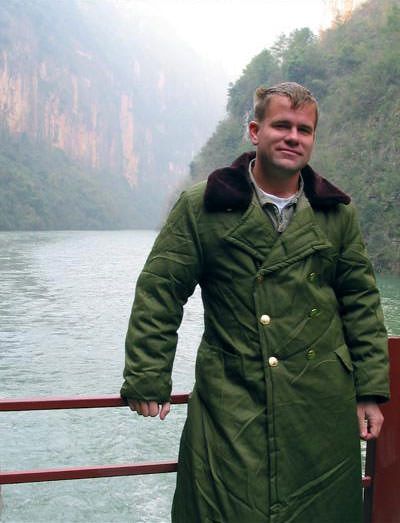
I donned my Chinese Army jacket, hoping to blend in...
...but I wasn't fooling anyone.
One look at me, and you know that I am certainly not a Chinese soldier.
I got a lot of stares from the crew, but they all knew that I had bribed one of the deck officers to get on board,
so there was nothing they could do about it.
The load on my back is getting heavy, and that is no way to travel on small boats and ships as you journey by the seat of your pants down river. So, I send two heavy boxes of Chinese art back to my partner Sandy in Beijing via "rail freight".
Hopping from boat to boat for 4 days, I make my way down the river. Even bribing my way onto a very small ship that was apparently operated by the Chinese Navy.
Past what will be the largest dam in the world when fully operational in 2009, I arrive in Yichang, which is not far from Wuhan, in Hubei Province.
The train and air travel from Yichang is limited, and I can not go directly to my next destination, I head to Shanghai, a wild city, and one of the most expensive places in all of China.
Shanghai is like no place on earth. Walk down one street and you will be greeted with the sight of 100 pair of underwear hanging from an apartment building to dry. Cross the river to Pudong, and only the glass and steel of modern skyscrapers fill your eyes.
I have a few friends in Shanghai who treat me like family, and take me for a night on the town. Great little rock bands complete with go-go dancers occupy almost every bar and club. It is enough to feel like Dorothy in the Wizard of Oz... ...I don't think I'm in China anymore...
With the crazy lifestyle of Shanghai behind me, I head to Jinan, in Shandong Province where I meet many artists. Of more than 30 artist's studios that I visit, I pick only 5 artists whose work is of the quality and style that I am looking for.
After several days in Jinan, and with a backpack heavy with art, I head home to Beijing, where all of the art that I have purchased during my trip will be mounted to create wonderful portraits and scrolls.
Click here to learn more about us and the origin of this art
The end of an art-buying adventure...
A Typical art-buying trip lasts for 6 weeks, and covers at least 4000 miles across China. Most of these miles are covered by train. It's not a bad way to go considering that you can go half-way across China for less than $100. On the downside, you can expect to spend about 30 hours straight on that cross-country train.
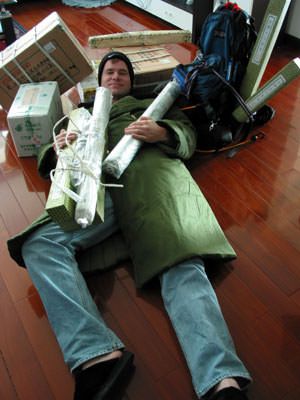
When I get back to Beijing, I am always exhausted, but happy that the art I bought for my customers has safely arrived as well.
When I started buying art to sell on the internet, I tried to carry it all back with me. But these days, I buy too much art to do that anymore. Last year I started to ship art back to Beijing as I traveled from city to city, and village to village. Occasionally, I use "train freight", but usually, I stick with "China Post" (The Chinese Postal Service).
Sometimes I worry if the precious artwork will get to Beijing safely, but so far, I have not lost a single package, and the Chinese postal system, while complicated, and full of red-tape, is very reliable.
Because the art I buy is just on raw xuan paper (rice paper), it can be rolled up or folded and packed in boxes without damaging it. Once the artwork arrives in Beijing, my business partner, Sandy, and I sort though the art and send a selection of it to be mounted.
In the mounted process, the artwork is flattened out and laminated to several more sheets of rice paper to make it thicker, yet pliable.
If the artwork is going to be a portrait, a nice silk border is added around the edges of the painting.
If we tell the mounter to build a scroll, the process is similar, but with a lot more silk with the addition of a wooden frame and ribbon at the top so that you can hang your scroll, and a scroll roller at the bottom.
The mounted portraits and scrolls take up a lot of space. If I mounted everything that I brought back from a trip at one time, it would probably fill half of a room. So we meter out the artwork to the mounter's studio little by little as we need it, and as we have room on our shelves.
Once we get a new batch of art, Sandy or I go to work taking tons of pictures in our little photo studio. It takes a full day to take 50 new art pictures, adjust them to the right size for our website, and upload the images to our server.
After that, I spend hours, usually with my wife, Cat, to work on translating the titles of the paintings, writing the artists' stories, and maybe writing up an adventure about how I located the various artists.
Meanwhile Sandy works several days a week packing and shipping all of the newly paid orders.
After I am finally happy with the story, the image of the art, and the quality of the art itself, it makes its way onto our website.
A typical piece of art often involves several hours, or even days of work by the artist, several days of hunting for the artist, spending time developing a relationship with the artist (be eating and drinking with them for a few days), up to a 2000 mile journey back to Beijing, and all the work that I mentioned above
It is a labor of love. I once did some math, and realized that for the time I spend, I am making the same as minimum wage in America. But in China, that puts me in "Upper Middle Class".
That, and I am one of the few people that can say that I truly love my job!
Cheers,
-Gary.
Click here to learn more about us and the origin of this art
As with most stories on this page, I wrote these between 2002 and 2008. They are time capsules of what was happening in China at the time. Most of the information still applies, though I found it's easier to buy deodorant in China these days.
Beijing/Peking Roast Duck:
If you order Peking Roast Duck, you should do so only in Beijing, China (anywhere else, it's just not the same).
A hot tip: Always ask how long it will take before the duck is served.
If they tell you any timeframe less than 30 minutes, change your mind and order the Kung Pao Chicken (Gong Bao Ji Ding) instead.
The reason: If they can serve Beijing Roast Duck in less than 30 minutes, that means you are getting "pre-cooked" duck.
If you have to "duck the duck", next time look for a restaurant with ducks hanging over an open wood fire.
The Bare Bones:
In the USA and most western countries, when people eat chicken, generally the breast meat and other white meat is preferred over dark meat.
However, in China, it is exactly the opposite.
In fact, check a supermarket in China and you'll find that chicken breasts are the cheapest cuts, while other cuts containing dark meat and bone get top dollar.
You will also find that traditional Chinese people wanting the freshest possible food will buy their chicken alive, and butcher it just before cooking a tasty meal.
And don't be put off by the bones in the chicken that you are served - all the bones, and even the head are usually served together and are seen in Chinese culture as a sign of quality and good taste.
Where's my fortune cookie?
So after traveling to China, you have just finished your first meal in a real Chinese restaurant.
But the bill comes, and the waiter forgot to bring everyone their fortune cookies!
Well, actually not...
You see, fortune cookies did not come from China (at least not directly).
One legend has it in the late 1800s or early 1900s, a Chinese man running a noodle making shop in San Francisco accidentally mixed a bunch of sugar in his dough, and didn't want to waste it. So he made cookies and stuck papers with people's fortunes on them as a novelty.
In the end, it's really the Chinese visitors to America that are confused when the waiter brings them a blob of sugary noodle dough with a piece of paper stuck in it.
Are you SURE?
You can search long and hard, in every drugstore and sundries market in China, and you will not find underarm deodorant for sale anywhere.
After traveling all over China, I know this to be true everywhere in China except Hong Kong.
If you ask a Chinese person why there is no deodorant for sale, they will tell you plainly, "Chinese people do not smell bad".
My reply is, "Have you never been on a crowded bus in the summer?"
Crossing the Street: Human Frogger in China
If you are from my generation, you may remember the video game called "Frogger". It involved crossing a busy road while narrowly dodging cars and truck, often both in front of and behind you at the same time.
Well you can play real live Frogger every time you cross the street in China. It is perfectly normal to cross a four or six-lane road, one lane at a time. You stand motionless on the white, dashed line between lanes as cars and trucks whiz by you on both sides with only inches to spare. When the next lane is clear, you advance (there is no retreat in this game, that could get you killed, since drivers in China would never expect that).
If you did this in America, drivers would come to a screeching halt and think you were crazy (they might even tell you so, using colorful words and hand gestures). It is simply a different culture, or rather a different way of doing things in modern Chinese culture.
Where's my soy sauce?
When you sit down to eat at a restaurant in China, you will almost never see a bottle of soy sauce on the table like you might at a Chinese restaurant in the USA or UK.
In Chinese cooking culture, soy sauce is a seasoning reserved for use in the kitchen.
The fact that soy sauce can be found at Chinese restaurants outside of China probably comes from westerner confusion between Japanese food and Chinese food.
The most popular Japanese food outside of Japan is sushi, which of course is always served with soy sauce. This is the most likely reason that soy sauce migrated out of the kitchen on onto the table at your Chinese restaurant in the west.
I pee freely:
If you come to China, save your small change...
In Beijing, the government recently passed a law against charging money for using a public toilet.
However, in other cities and towns around China, expect to pay between 2-5 mao (about 3-5 cents) for the use.
Bring your own toilet paper, or expect to pay 5 mao for a small pack of tissue as you enter.
In my opinion, the best public toilet in all of China is at Tian'anmen Square.
This public restroom is not only clean, but also features its own gift shop.
Vehicular and Pedestrian Yielding Quotient
When crossing a street, or merely making your way down the road, there is a certain law of physics that comes into play: When two forces meet, one must yield.
Here is the general yielding scheme in China:
Cars yield to big buses and trucks.
Bicycles and cars mingle and narrowly avoid each other. When push comes to shove, the bicyclist knows he will lose the fight. But the car driver knows that the bicycle will scratch his car when he runs it over, and will only yield on that premise.
Cars will not yield to, but are required to avoid pedestrians. When you hit a pedestrian at low speed, it does very little damage, and unlike a bicycle, will almost never scratch your car. Therefore pedestrians are given a smaller margin.
Note: Regardless of green or red stop lights, it is against the law to come to a complete stop when making a right hand turn in China (no matter how many pedestrians are in the way). The rule is "honk and avoid, then continue on your way".
Motor scooters yield to no one, not even when they are being driven on a pedestrian-filled sidewalk. Motor scooters zip around like they have nothing to lose - this may be true, as smaller motor scooters require no license of any kind and are very cheap.
If you are driving on the wrong side of the road, or going the wrong way on a one-way street, you do not have to yield to anyone, no matter what kind of vehicle you are operating.
Cars will yield (not by choice) to pedestrians crossing the street in numbers greater than 10 (it is best in China to invite 9 of your friends for an outing if you plan to cross a lot of streets).
In lieu of yielding, drivers are required to honk at pedestrians. I swear to God, this is the law! It's a safety issue: If you are passing a pedestrian that is walking on the side of the road, you are required by law to honk at them to let them know you are there.
Note: All streets in Chinese cities, sound like a New York traffic jam 24 hours per day with all this "safety honking".
I have not been able to find a traffic law that states you must yield to ambulances. And in practice, very few drivers do.
When two large vehicles come face to face on a narrow roadway, and neither can pass, neither will yield. They will sit there, honking at each other for a while. After several cars are lined up behind them, they will decide that they should have yielded earlier, and start to back up. This is to the great dismay of all the cars behind them who will honk in unison. This could go on for an hour or more. It ends when a police officer arrives, tells both drivers what idiots they are, issues tickets to both of them, and then systematically makes the situation worse by insisting that all the smaller cars turn around (rather than back up) by making 162-point turns in the small roadway. Eventually, two of the cars will hit each other, for which both drivers will be cited and fined on the spot.
More traffic tidbits:
Parking your car on the sidewalk is legal in most places in China. I am talking fully on the sidewalk, and fully blocking the sidewalk, so that nobody can walk there at all. After all, there is a perfectly good roadway for pedestrians and cars to share just past the edge of the sidewalk - right?
In many urban areas, there is a sidewalk parking attendant who will ensure that you park in such a way that no one can use the sidewalk at all. They will also charge a fee of 2 Yuan (26 cents) for up to a full day of sidewalk parking privileges.
The green light means "go". The Yellow light means "20 more cars should enter the intersection". The red light means "5 more cars enter the intersection and become a nuisance to pedestrians trying to cross the street".
Actually, the green light means "Try to go, but you'll probably have to wait for the yellow or red light before you get your chance".
If you get in a car accident, it's best to argue briefly with the other driver, and then both drive away. When the police get involved, everyone gets fined, and someone might lose their license. The fines are generally higher than what it will cost to fix your car, so hanging around to exchange insurance information is rare in minor fender-benders.
If your car is too damaged to drive away, you are screwed. The police own and operate all of the tow trucks in most Chinese cities. You will be fined, charged for towing, charged an impound fee, and may lose your license.
On long stretches of highway, police checkpoints are occasionally set up. They may be stopping drivers and summarily fining them for wearing sunglasses or talking on a mobile phone while driving. However, in the next stretch of highway, another police checkpoint may be issuing fines for driving without sunglasses.
Under certain circumstances, and if you are really unlucky, drivers who get in injury accidents while drunk may be executed. If you are caught drinking and driving just once, you will be fined, and will probably lose your drivers license for the rest of your life.
Thus, drunk driving has become very rare in China.
